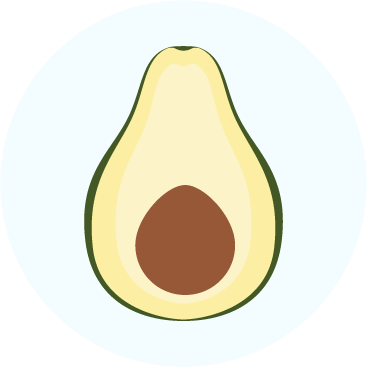Table of Contents
When striving for optimal health, incorporating superfoods into your diet is a game-changer. These nutritional powerhouses are celebrated for their dense concentration of vitamins, minerals, and beneficial natural compounds. Embracing superfoods is a transformative approach to enhancing your diet and overall nutrient intake, offering profound benefits to your entire body.
The most exciting part? A multitude of the world's most potent superfoods are inherently plant-based, aligning perfectly with a vegan lifestyle. In this guide, we'll dive into the essence of superfoods - their definition, significance, and the compelling reasons to integrate them into your daily meals. Plus, we'll spotlight the top vegan superfoods that are not only health-boosting but also delicious additions to your dietary routine. Get ready to enrich your diet with the best that nature offers!
What Is A Superfood?

The term "superfood" might sound like it was crafted in a scientist's lab, but its origins are more grounded in marketing strategy than nutritional science. It was first used by the United Fruit Company as a clever way to boost banana sales during World War I, leveraging the fruit's nutritional value and affordability.
But don't let its commercial beginnings fool you. The label "superfood" does indeed capture the essence of some of the most beneficial foods recommended by dietitians and nutritionists. These are the foods they urge us to include more frequently in our diets.
At its core, a superfood is characterized by its nutrient density. Sometimes referred to as "functional foods," these are items that pack a healthy punch in every bite. Fruits and vegetables often lead the pack in this category.
What sets these superfoods apart is either their richness in a particular vital nutrient or their broad spectrum of bioactive compounds, addressing various nutritional needs. Take seaweed, for example; it's celebrated as a superfood due to its high omega-3 fatty acids content. Quinoa is another star in the superfood realm, prized for its protein, complex carbs, and an array of vitamins and minerals. Then there's the ever-popular blueberry, loaded with antioxidants. Beyond their nutrient profile, many of these superfoods are also linked to specific health benefits, such as enhancing heart health.
Benefits of Superfoods

Despite its marketing origins, the term "superfood" accurately represents the extraordinary nutritional profiles of certain foods, which significantly contribute to health and wellness. These nutrient-dense powerhouses are crucial for a well-rounded diet, packing a punch with every serving.
Integrating more superfoods into your meals means enhancing your intake of essential nutrients such as vitamins, minerals, and dietary fiber. For those focusing on a plant-based diet, including a variety of fruits and vegetables enriches your diet with phytonutrients. These plant-derived compounds are known for their antioxidant properties, playing a vital role in minimizing cellular damage.
Regular consumption of superfoods, as part of a balanced diet, can bolster your immune system and strengthen your body's defenses against common chronic conditions and diseases. Some superfoods are even associated with anti-aging benefits, slowing down the signs of aging.
Superfoods are particularly beneficial for those following specific dietary regimens like veganism. Since vegans exclude animal products, which are traditional sources of nutrients like Vitamins B and K, incorporating plant-based superfoods is an excellent way to ensure they're getting these vital nutrients. Thus, superfoods are not just beneficial but also adaptable, fitting seamlessly into various dietary preferences and restrictions.
Top 10 Essential Vegan Superfoods for Optimal Health
1. Goji berries

Goji berries, also known as wolfberries, are a prime example of what makes a superfood truly super. These small yet mighty berries boast a diverse range of nutrients that contribute significantly to health and wellness. Rich in biologically active compounds like carotenoids, phenolic acid, and flavonoids, goji berries are champions at combating oxidative stress and minimizing cellular damage.
But the benefits of goji berries extend beyond their antioxidant prowess. Each serving is packed with essential nutrients, including copper, selenium, vitamins A and C, along with a host of essential amino acids. This nutritional profile isn't just impressive on paper; it translates into real health benefits. Regular consumption of goji berries is associated with improved eye health and vision, thanks to their high antioxidant content. Furthermore, their potent antioxidative properties may also play a role in slowing down aging processes and combating oxidative damage, which is linked to cancer.
2. Seaweed

Seaweed, a form of algae, is an unassuming yet incredibly nutrient-rich food. This superfood comes in two main types: microalgae and macroalgae. Both forms are treasure troves of essential nutrients, making them a valuable addition to a vegan diet.
For protein enthusiasts, certain algae are emerging as a promising alternative protein source. Algae-based protein powders are gaining popularity, offering a plant-based protein solution. Additionally, microalgae are a primary natural source of omega-3 fatty acids, known for their beneficial effects on heart, brain, and eye health.*
Seaweed isn't just about protein and omega-3s, though. It's a potent source of several vitamins and minerals, including calcium, iron, magnesium, and vitamins A, C, and B12 – the latter being particularly notable as one of the few vegan-friendly sources of this crucial vitamin.
Incorporating seaweed into your diet can be both easy and delicious. Dried seaweed, like nori, is a staple in Japanese cuisine, often used in sushi rolls. Spirulina, another form of algae, is a popular addition to smoothies for an extra vitamin and mineral kick. For those seeking omega-3 supplements, algae oil capsules provide a vegan-friendly alternative to traditional fish oil.
3. Green tea

Green tea has rightfully earned its place in the health and wellness community. This soothing beverage is abundant in catechins, organic compounds recognized for their myriad health benefits. Among the many advantages of green tea, its catechins are particularly noted for their potential in reducing blood pressure, combating oxidative damage, and even decreasing the risk of obesity-related conditions, such as Type 2 diabetes.
But the perks of green tea extend beyond these significant health benefits. It's a gentler source of caffeine compared to other caffeinated drinks like energy drinks and coffee. This makes green tea not just a soothing pick-me-up but also a strategic ally in boosting metabolism and enhancing fat oxidation. With these properties, green tea emerges as an excellent vegan superfood for those looking to manage their weight effectively. Its moderate caffeine content, coupled with health-boosting catechins, makes it a wise choice for anyone seeking a balanced approach to wellness.
4. Turmeric

Turmeric, a member of the ginger family, is much more than a vibrant spice used in culinary creations like curry. It has deep roots in Ayurvedic medicine, thanks to curcumin, its primary active component. Curcumin is renowned for its potent antioxidant and anti-inflammatory properties.*
Research into curcumin, while complex, has indicated that turmeric can be particularly beneficial for those dealing with inflammatory conditions such as arthritis, anxiety, high cholesterol, and muscle soreness. Its inclusion in a diet can significantly support overall health and wellness.*
Turmeric's versatility in the kitchen makes it easy to incorporate into your diet. Beyond its traditional role as a spice in cooking, turmeric can be added to smoothies or used to brew herbal teas. These methods are not only delicious but also effective ways to boost your intake of this golden superfood, empowering your body to combat inflammation and promote health.*
5. Acai berries

Originating from Brazil, the Acai berry has surged in popularity as a superfood, primarily due to its extraordinary antioxidant properties. These berries are especially abundant in anthocyanins, the plant-based antioxidants responsible for their distinctive deep purple-black color. Anthocyanins are not just about color; they play a crucial role in combating inflammation and the various health issues associated with it.
Acai berries are often celebrated as the star ingredient in smoothie bowls, a delicious and healthful trend. To harness the full potential of this superfruit, blend acai pulp with pure ingredients like coconut water and garnish with other nutritious toppings such as pumpkin seeds, bananas, and berries. This combination not only tastes delightful but also significantly boosts your nutrient intake. Additionally, acai berries are available in other forms, like juices and powders, offering versatile ways to incorporate them into your diet.
6. Cacao

Cacao, hailing from South America, can be considered the pure, nutrient-rich cousin of the chocolate we commonly enjoy. Both originate from the same source: the cacao seed. However, the key difference lies in the processing. Unlike chocolate, which undergoes roasting at high temperatures, cacao is processed at lower temperatures. This method preserves its natural bitterness but, more importantly, retains the full spectrum of its superfood nutrition.
In its unprocessed form, cacao stands out as a nutritional dynamo, boasting a higher concentration of polyphenolic antioxidants than even renowned superfoods like blueberries and goji berries. Cacao is also a valuable source of various other nutrients, including magnesium, dietary fiber, potassium, and iron. This makes it not just a treat for the taste buds but a beneficial addition to a health-conscious diet.
7. Flaxseeds

Flaxseeds are a cornerstone in vegan and vegetarian diets, revered for their high-nutrition profile. As a functional food, they pack a significant amount of plant-based protein—comprising about 20-30% of their weight. This makes them a versatile ingredient in a variety of plant-based dishes and snacks. Beyond protein, flaxseeds are rich in both soluble and insoluble fibers, aiding digestion and promoting a feeling of fullness, which is particularly beneficial for weight management.
But the nutritional benefits of flaxseeds don't stop there. They are a prime source of alpha-linolenic acid, an omega-3 fatty acid known for its anti-inflammatory properties. Additionally, flaxseeds are packed with a range of micronutrients, including vitamins A, C, E, and F, as well as minerals like phosphorus, magnesium, iron, sodium, potassium, and zinc.
For optimal digestion and absorption, consider opting for ground flaxseeds. They can be easily incorporated into your daily meals, whether sprinkled over cereals and yogurts, blended into smoothies, or added to your favorite baked goods. This simple addition can significantly enhance the nutritional value of your meals.
8. Kale

Kale has become a superstar in the world of healthy greens, largely thanks to its incredible nutrient density. This cruciferous vegetable is a powerhouse of vitamins and minerals. As per WebMD, a single cup of raw kale is not just a leafy green—it's a nutritional treasure trove. It provides nearly 3 grams of protein, 2.5 grams of fiber, and a host of other nutrients like folate, omega-3 fatty acids, lutein, phosphorous, potassium, zinc, calcium, and vitamins A, C, and K. Despite its nutrient richness, kale remains low in calories, with that same cup yielding a mere 33 calories.
Kale's versatility in the kitchen is as impressive as its nutritional profile. It can be enjoyed raw in salads, adding a fresh, nutritious punch, or cooked into dishes like stir-fries for a hearty green addition. For a healthier snack alternative, try baking or air-frying kale to create crispy, nutrient-packed chips.
9. Sauerkraut

For those following a plant-based diet, finding vegan-friendly sources of probiotics can be a challenge. Probiotics are essential for maintaining gut health and supporting the immune system, and while they are commonly found in fermented dairy products like yogurt and kefir, these are not suitable for vegans. Enter sauerkraut, a delightful and vegan-friendly probiotic option.
Sauerkraut is created by fermenting raw cabbage with lactic acid bacteria in a brine solution. This fermentation process transforms the cabbage into a tangy, flavorful condiment that not only enriches the taste of your meals but also provides a substantial boost to your gut health. Sauerkraut can be versatile in the kitchen; it's perfect as a zesty addition to sandwiches, a flavorful complement to vegetables, or even as a unique dip. With each serving, you're not just enjoying a burst of flavor but also nourishing your gut with beneficial probiotics.
10. Avocado

Avocados are more than just a trendy food item; they are a genuine superfood. Known for their creamy texture and rich flavor, avocados are a powerhouse of nutrition. They are abundant in healthy unsaturated fats, which not only promote heart health but also aid in the absorption of fat-soluble vitamins like K, D, and E. But the benefits don't end there; avocados also provide a wealth of other nutrients, including lutein, beta-carotene, and omega-3 fatty acids.
One of the standout features of avocados is their satiating quality. They can keep you feeling full longer, which is a great advantage for weight management. However, like all good things, they are best enjoyed in moderation to balance their calorie content with their nutritional benefits.
Avocados are incredibly versatile in the kitchen. They can be used as a rich topping for grain bowls and salads, mashed onto toast for a nutritious breakfast, or blended into dips for a healthy snack option.


